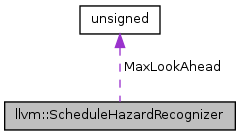#include <ScheduleHazardRecognizer.h>


Public Types | |
| enum | HazardType { NoHazard, Hazard, NoopHazard } |
Public Member Functions | |
| ScheduleHazardRecognizer () | |
| virtual | ~ScheduleHazardRecognizer () |
| unsigned | getMaxLookAhead () const |
| bool | isEnabled () const |
| virtual bool | atIssueLimit () const |
| virtual HazardType | getHazardType (SUnit *m, int Stalls=0) |
| virtual void | Reset () |
| virtual void | EmitInstruction (SUnit *) |
| virtual unsigned | PreEmitNoops (SUnit *) |
| virtual bool | ShouldPreferAnother (SUnit *) |
| virtual void | AdvanceCycle () |
| virtual void | RecedeCycle () |
| virtual void | EmitNoop () |
Protected Attributes | |
| unsigned | MaxLookAhead |
Detailed Description
HazardRecognizer - This determines whether or not an instruction can be issued this cycle, and whether or not a noop needs to be inserted to handle the hazard.
Definition at line 25 of file ScheduleHazardRecognizer.h.
Member Enumeration Documentation
Definition at line 37 of file ScheduleHazardRecognizer.h.
Constructor & Destructor Documentation
Definition at line 34 of file ScheduleHazardRecognizer.h.
| ScheduleHazardRecognizer::~ScheduleHazardRecognizer | ( | ) | [virtual] |
Definition at line 642 of file ScheduleDAG.cpp.
Member Function Documentation
| virtual void llvm::ScheduleHazardRecognizer::AdvanceCycle | ( | ) | [inline, virtual] |
AdvanceCycle - This callback is invoked whenever the next top-down instruction to be scheduled cannot issue in the current cycle, either because of latency or resource conflicts. This should increment the internal state of the hazard recognizer so that previously "Hazard" instructions will now not be hazards.
Reimplemented in llvm::ScoreboardHazardRecognizer, llvm::PPCHazardRecognizer970, llvm::PPCDispatchGroupSBHazardRecognizer, and llvm::ARMHazardRecognizer.
Definition at line 94 of file ScheduleHazardRecognizer.h.
Referenced by llvm::SchedBoundary::bumpCycle(), and EmitNoop().
| virtual bool llvm::ScheduleHazardRecognizer::atIssueLimit | ( | ) | const [inline, virtual] |
atIssueLimit - Return true if no more instructions may be issued in this cycle.
FIXME: remove this once MachineScheduler is the only client.
Reimplemented in llvm::ScoreboardHazardRecognizer.
Definition at line 51 of file ScheduleHazardRecognizer.h.
| virtual void llvm::ScheduleHazardRecognizer::EmitInstruction | ( | SUnit * | ) | [inline, virtual] |
EmitInstruction - This callback is invoked when an instruction is emitted, to advance the hazard state.
Reimplemented in llvm::ScoreboardHazardRecognizer, llvm::PPCHazardRecognizer970, llvm::PPCDispatchGroupSBHazardRecognizer, and llvm::ARMHazardRecognizer.
Definition at line 71 of file ScheduleHazardRecognizer.h.
Referenced by llvm::SchedBoundary::bumpNode().
| virtual void llvm::ScheduleHazardRecognizer::EmitNoop | ( | ) | [inline, virtual] |
EmitNoop - This callback is invoked when a noop was added to the instruction stream.
Reimplemented in llvm::PPCDispatchGroupSBHazardRecognizer.
Definition at line 103 of file ScheduleHazardRecognizer.h.
References AdvanceCycle().
| virtual HazardType llvm::ScheduleHazardRecognizer::getHazardType | ( | SUnit * | m, |
| int | Stalls = 0 |
||
| ) | [inline, virtual] |
getHazardType - Return the hazard type of emitting this node. There are three possible results. Either: NoHazard: it is legal to issue this instruction on this cycle. Hazard: issuing this instruction would stall the machine. If some other instruction is available, issue it first. NoopHazard: issuing this instruction would break the program. If some other instruction can be issued, do so, otherwise issue a noop.
Reimplemented in llvm::ScoreboardHazardRecognizer, llvm::PPCHazardRecognizer970, llvm::ARMHazardRecognizer, and llvm::PPCDispatchGroupSBHazardRecognizer.
Definition at line 60 of file ScheduleHazardRecognizer.h.
References NoHazard.
Referenced by llvm::SchedBoundary::checkHazard().
| unsigned llvm::ScheduleHazardRecognizer::getMaxLookAhead | ( | ) | const [inline] |
Definition at line 43 of file ScheduleHazardRecognizer.h.
References MaxLookAhead.
| bool llvm::ScheduleHazardRecognizer::isEnabled | ( | ) | const [inline] |
Definition at line 45 of file ScheduleHazardRecognizer.h.
References MaxLookAhead.
Referenced by llvm::SchedBoundary::bumpCycle(), llvm::SchedBoundary::bumpNode(), llvm::SchedBoundary::checkHazard(), llvm::SchedBoundary::reset(), and llvm::ScoreboardHazardRecognizer::ScoreboardHazardRecognizer().
| virtual unsigned llvm::ScheduleHazardRecognizer::PreEmitNoops | ( | SUnit * | ) | [inline, virtual] |
PreEmitNoops - This callback is invoked prior to emitting an instruction. It should return the number of noops to emit prior to the provided instruction. Note: This is only used during PostRA scheduling. EmitNoop is not called for these noops.
Reimplemented in llvm::PPCDispatchGroupSBHazardRecognizer.
Definition at line 78 of file ScheduleHazardRecognizer.h.
| virtual void llvm::ScheduleHazardRecognizer::RecedeCycle | ( | ) | [inline, virtual] |
RecedeCycle - This callback is invoked whenever the next bottom-up instruction to be scheduled cannot issue in the current cycle, either because of latency or resource conflicts.
Reimplemented in llvm::ScoreboardHazardRecognizer, llvm::PPCDispatchGroupSBHazardRecognizer, and llvm::ARMHazardRecognizer.
Definition at line 99 of file ScheduleHazardRecognizer.h.
Referenced by llvm::SchedBoundary::bumpCycle().
| virtual void llvm::ScheduleHazardRecognizer::Reset | ( | ) | [inline, virtual] |
Reset - This callback is invoked when a new block of instructions is about to be schedule. The hazard state should be set to an initialized state.
Reimplemented in llvm::ScoreboardHazardRecognizer, llvm::PPCHazardRecognizer970, llvm::PPCDispatchGroupSBHazardRecognizer, and llvm::ARMHazardRecognizer.
Definition at line 67 of file ScheduleHazardRecognizer.h.
Referenced by llvm::SchedBoundary::bumpNode().
| virtual bool llvm::ScheduleHazardRecognizer::ShouldPreferAnother | ( | SUnit * | ) | [inline, virtual] |
ShouldPreferAnother - This callback may be invoked if getHazardType returns NoHazard. If, even though there is no hazard, it would be better to schedule another available instruction, this callback should return true.
Reimplemented in llvm::PPCDispatchGroupSBHazardRecognizer.
Definition at line 85 of file ScheduleHazardRecognizer.h.
Member Data Documentation
unsigned llvm::ScheduleHazardRecognizer::MaxLookAhead [protected] |
MaxLookAhead - Indicate the number of cycles in the scoreboard state. Important to restore the state after backtracking. Additionally, MaxLookAhead=0 identifies a fake recognizer, allowing the client to bypass virtual calls. Currently the PostRA scheduler ignores it.
Definition at line 31 of file ScheduleHazardRecognizer.h.
Referenced by getMaxLookAhead(), isEnabled(), and llvm::ScoreboardHazardRecognizer::ScoreboardHazardRecognizer().
The documentation for this class was generated from the following files:
 1.7.6.1
1.7.6.1